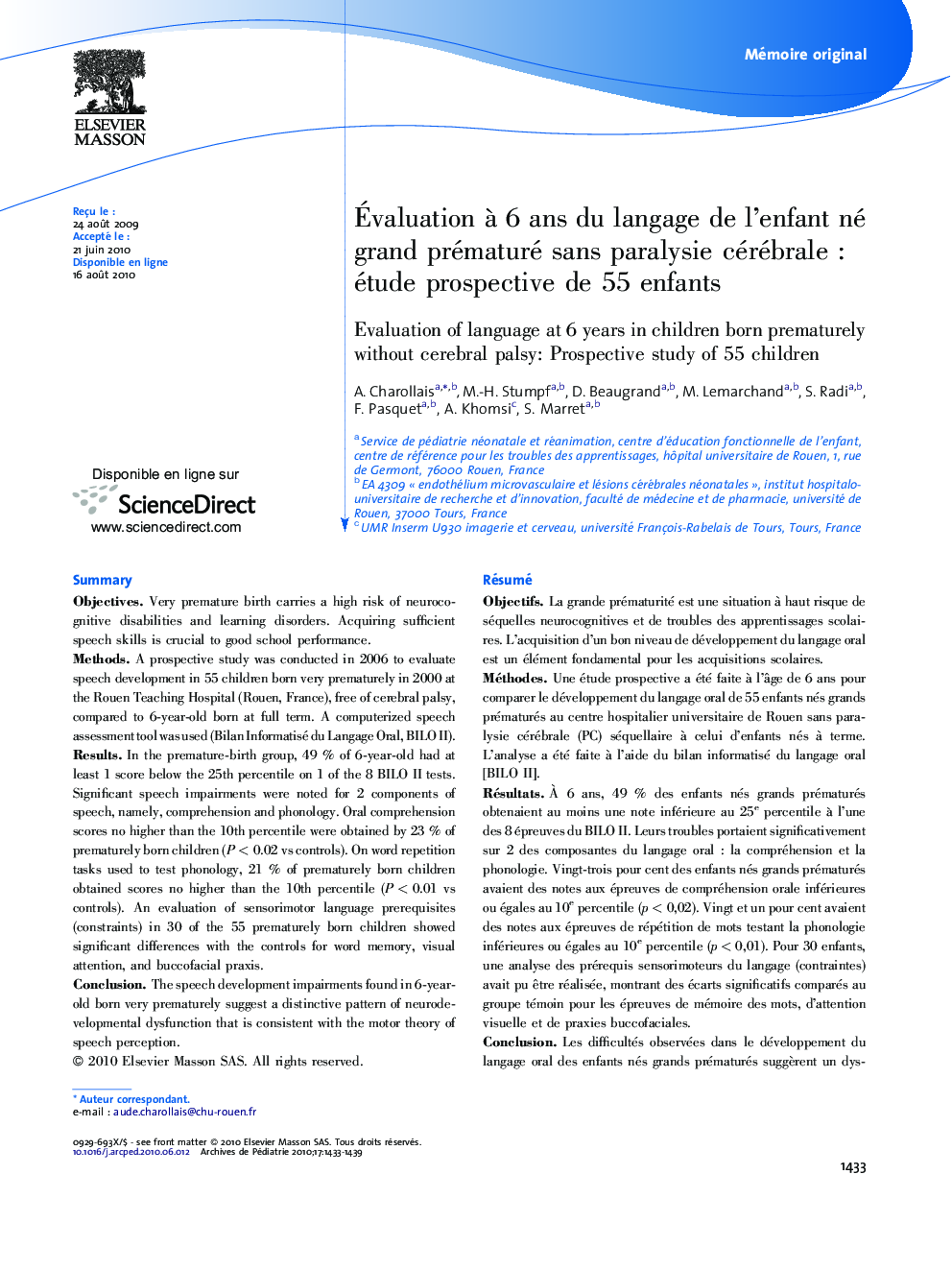| Article ID | Journal | Published Year | Pages | File Type |
|---|---|---|---|---|
| 4148182 | Archives de Pédiatrie | 2010 | 7 Pages |
RésuméObjectifsLa grande prématurité est une situation à haut risque de séquelles neurocognitives et de troubles des apprentissages scolaires. L’acquisition d’un bon niveau de développement du langage oral est un élément fondamental pour les acquisitions scolaires.MéthodesUne étude prospective a été faite à l’âge de 6 ans pour comparer le développement du langage oral de 55 enfants nés grands prématurés au centre hospitalier universitaire de Rouen sans paralysie cérébrale (PC) séquellaire à celui d’enfants nés à terme. L’analyse a été faite à l’aide du bilan informatisé du langage oral [BILO II].RésultatsÀ 6 ans, 49 % des enfants nés grands prématurés obtenaient au moins une note inférieure au 25e percentile à l’une des 8 épreuves du BILO II. Leurs troubles portaient significativement sur 2 des composantes du langage oral : la compréhension et la phonologie. Vingt-trois pour cent des enfants nés grands prématurés avaient des notes aux épreuves de compréhension orale inférieures ou égales au 10e percentile (p < 0,02). Vingt et un pour cent avaient des notes aux épreuves de répétition de mots testant la phonologie inférieures ou égales au 10e percentile (p < 0,01). Pour 30 enfants, une analyse des prérequis sensorimoteurs du langage (contraintes) avait pu être réalisée, montrant des écarts significatifs comparés au groupe témoin pour les épreuves de mémoire des mots, d’attention visuelle et de praxies buccofaciales.ConclusionLes difficultés observées dans le développement du langage oral des enfants nés grands prématurés suggèrent un dysfonctionnement développemental particulier compatible avec l’hypothèse de la théorie motrice de la perception de la parole.
SummaryObjectivesVery premature birth carries a high risk of neurocognitive disabilities and learning disorders. Acquiring sufficient speech skills is crucial to good school performance.MethodsA prospective study was conducted in 2006 to evaluate speech development in 55 children born very prematurely in 2000 at the Rouen Teaching Hospital (Rouen, France), free of cerebral palsy, compared to 6-year-old born at full term. A computerized speech assessment tool was used (Bilan Informatisé du Langage Oral, BILO II).ResultsIn the premature-birth group, 49 % of 6-year-old had at least 1 score below the 25th percentile on 1 of the 8 BILO II tests. Significant speech impairments were noted for 2 components of speech, namely, comprehension and phonology. Oral comprehension scores no higher than the 10th percentile were obtained by 23 % of prematurely born children (P < 0.02 vs controls). On word repetition tasks used to test phonology, 21 % of prematurely born children obtained scores no higher than the 10th percentile (P < 0.01 vs controls). An evaluation of sensorimotor language prerequisites (constraints) in 30 of the 55 prematurely born children showed significant differences with the controls for word memory, visual attention, and buccofacial praxis.ConclusionThe speech development impairments found in 6-year-old born very prematurely suggest a distinctive pattern of neurodevelopmental dysfunction that is consistent with the motor theory of speech perception.
